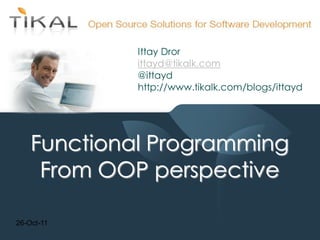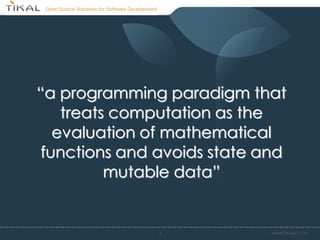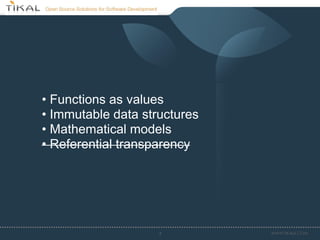Functional Programming from OO perspective (Sayeret Lambda lecture)
- 1. Ittay Dror [email protected] @ittayd http://www.tikalk.com/blogs/ittayd Functional Programming From OOP perspective 26-Oct-11
- 2. What is FP? 2 WWW.TIKALK.COM
- 3. “a programming paradigm that treats computation as the evaluation of mathematical functions and avoids state and mutable data” 3 WWW.TIKALK.COM
- 4. • Functions as values • Immutable data structures • Mathematical models • Referential transparency 4 WWW.TIKALK.COM
- 5. Why Should We Care? 5 WWW.TIKALK.COM
- 6. Not everything is an object 6 WWW.TIKALK.COM
- 7. May Forget Nothing to service.init return? val data = service.get service.close May forget / call twice println(data) 7 WWW.TIKALK.COM
- 8. IOC 8 WWW.TIKALK.COM
- 9. class Service { def withData[T](f: Data => T) { init if (thereIsData) f(getData) close } } service.witData(println) 9 WWW.TIKALK.COM
- 10. Simplification 10 WWW.TIKALK.COM
- 11. In OOP: trait DataConsumer[T] { def withData(data: Data): T { In FP: Data => T 11 WWW.TIKALK.COM
- 12. Factories are partially applied functions 12 WWW.TIKALK.COM
- 13. val factory_: File => String => User = file => name => readFromFile(name) val factory: String => User = factory_(usersFile) Look ma, no interfaces 13 WWW.TIKALK.COM
- 14. Security 14 WWW.TIKALK.COM
- 15. Immutable data is sharable 15 WWW.TIKALK.COM
- 16. Instead of modifying, create new 16 WWW.TIKALK.COM
- 17. Abstraction 17 WWW.TIKALK.COM
- 18. Functors, Applicatives, Monads 18 WWW.TIKALK.COM
- 19. Usual way of describing: WTF?? 19 WWW.TIKALK.COM
- 20. OO way: Design Patterns 20 WWW.TIKALK.COM
- 21. Values in a context 21 WWW.TIKALK.COM
- 22. Option[X] List[X] Future[X] 22 WWW.TIKALK.COM
- 23. trait Future[A] { def get: A { def findUser(name: String): Future[User] = … … val future = findUser(userName) val user = future.get println(user) 23 WWW.TIKALK.COM
- 24. trait Future[A] { def onReady(f: A => Unit) } val future = findUser(userName) future.onReady{user => println(user)} 24 WWW.TIKALK.COM
- 25. Functor 25 WWW.TIKALK.COM
- 26. trait Future[A] { def map[B](f: A => B): Future[B] { val user = findUser(userName) val age: Future[Int] = user.map{user => user.age} 26 WWW.TIKALK.COM
- 27. val result = new ArrayList(list.size) for (i <- 0 to (list.size - 1)) { result += compute(list(i)) } result Vs. list.map(compute) 27 WWW.TIKALK.COM
- 28. class ComputeTask extends RecursiveTask { def compute = // split and call invokeAll... { val pool = new ForkJoinPool() val task = new ComputeTask() pool.invoke(task) Vs. list.par.map(compute) 28 WWW.TIKALK.COM
- 29. trait Future[A] { def get: A def map[B](f: A => B) = new Future[B] { def get = f(Future.this.get) { { 29 WWW.TIKALK.COM
- 30. def marry(man: User, woman: User): Family = ⠄⠄⠄ val joe = findUser("joe") val jane = findUser("jane") Get Joe and Jane married 30 WWW.TIKALK.COM
- 31. Future[Family] User => Family joe.map{joe => jane.map{jane => marry(joe, jane)}} User => Future[Family] Future[Future[Family]] 31 WWW.TIKALK.COM
- 32. Attempt I trait Future[A] { def apply[B, C](other: Future[B], f: (A, B) => C): Future[C] } joe.apply(jane, marry) 32 WWW.TIKALK.COM
- 33. It is easier to work with single argument functions 33 WWW.TIKALK.COM
- 34. Curried Functions val func: Int => Int => Int = a => b => a + b (marry _).curried 34 WWW.TIKALK.COM
- 35. Attempt II trait Future[A] { ... def apply[B](f: Future[A => B]): Future[B] { 35 WWW.TIKALK.COM
- 36. Future[User => Family] User => User => Family joe.apply(jane.map((marry _).curried)) User => Future[Family] 36 WWW.TIKALK.COM
- 37. We can do better 37 WWW.TIKALK.COM
- 38. val marry: Future[User => User => Family] = Future(marry) val partial: Future[User => Family] = futureMarry.apply(joe) val family: Future[Family] = partial.apply(jane) Future(marry).apply(joe).apply(jane) Future(marry)(joe)(jane) Using apply compiles iff A is a function 38 WWW.TIKALK.COM
- 39. Applicative Functors 39 WWW.TIKALK.COM
- 40. • Put value in context • Apply function in a context to value in a context 40 WWW.TIKALK.COM
- 41. trait Future[A] { def apply[B, C](b: Future[B]) (implicit ev: A <:< (B => C)) : Future[C] { object Future { def apply[A](a: A): Future[A] } Future((marry _).curried)(joe)(jane) 41 WWW.TIKALK.COM
- 42. trait Future[A] { def apply[B, C](b: Future[B]) (implicit ev: A <:< (B => C)) = new Future[C] { def get = Future.this.get(b.get) { { object Future { def apply[A](a: A) = new Future[A] { def get = a } } } 42 WWW.TIKALK.COM
- 43. Composing Functions that Return Value in a Context 43 WWW.TIKALK.COM
- 44. Composing Special Functions def findUser(name: String): Future[User] def findProfile(user: User): Future[Profile] findProfile(findUser("joe")) 44 WWW.TIKALK.COM
- 45. Monads 45 WWW.TIKALK.COM
- 46. trait Future[A] { ... def flatMap[B](f: A => Future[B]): Future[B] } findUser("joe").flatMap(findProfile) 46 WWW.TIKALK.COM
- 47. trait Future[A] { ... def flatMap[B](f: A => Future[B]): Future[B] = new Future[B] { def get = f(Future.this.get).get } } } 47 WWW.TIKALK.COM
- 48. All Together trait Context[A] { def map[B](f: A => B): Context[B] def apply[B, C](b: Context[B]) (implicit ev: A <:< (B => C)): Context[C] def flatMap[B](f: A => Context[B]): Context[B] } 48 WWW.TIKALK.COM
- 49. Laws 49 WWW.TIKALK.COM
- 50. Idiomatic “interface” for context classes 50 WWW.TIKALK.COM
- 51. Monoid • For type A to be (have) a Monoid: • Binary operation „•„: (A, A) => A • Identity element „∅‟: A 51 WWW.TIKALK.COM
- 52. • String is a Monoid (2 ways): • Binary operation: append or prepend • Identity element: “” • Int is a Monoid (2 ways): • Binary operation: + or * • Identity element: 0 or 1 52 WWW.TIKALK.COM
- 53. • Future[A] is a monoid, if A is a monoid • Binary operation: Future(A#•) • (Future as applicative) • Identity element: Future(A#identity) 53 WWW.TIKALK.COM
- 54. Monoids generalize folds 54 WWW.TIKALK.COM
- 55. Folds: reduce values to one • List(x,y,z) => ∅ • x • y • z • Option(x) => if Some ∅ • x else ∅ 55 WWW.TIKALK.COM
- 56. Unfolds: Create values from initial value and function • 1, if (a < 3) Some(a, a+1) else None • Some(1, 2), Some(2, 3), None • ∅•1•2•3 • If our monoid is a List: • Nil ++ List(1) ++ List(2) ++ List(3) • List(1,2,3) 56 WWW.TIKALK.COM
- 57. Since many things are monoids, we can have many generic algorithms 57 WWW.TIKALK.COM
- 58. Problems with subtyping: • Namespace pollution • Need to control the class • Describes behavior, not „is-a‟ • Sometimes ability is conditional: • Future is a monoid if A is a monoid • Sometimes there are different definitions • E.g., 2 monoids for integers • Maybe a class has several facets • E.g. context of 2 values 58 WWW.TIKALK.COM
- 59. Typeclass • Define an API • Create instance for each class that can conform to the API 59 WWW.TIKALK.COM
- 60. Java example: Comparator 60 WWW.TIKALK.COM
- 61. trait Functor[F[_]] { def map[A, B](fa: F[A], f: A => B): F[B] { implicit object FutureHasFunctor extends Functor[Future] { def map[A, B](t: Future[A], f: A => B) = new Future[B] { def get = f(t.get) } } { def age(name: String) = { val functor = implicitly[Functor[Future]] functor.map(findUser(name), {u: User => u.age}) } 61 WWW.TIKALK.COM
- 62. def age(name: String) (implicit functor: Functor[Future]) { functor.map(findUser(name), {u: User => u.age}) } 62 WWW.TIKALK.COM
- 63. def age[F[_] : Functor](name: String) { functor.map(findUser(name), {u: User => u.age}) } 63 WWW.TIKALK.COM
- 64. Generic Programming 64 WWW.TIKALK.COM
- 65. def sequence[A, AP[_] : Applicative] (apas: List[AP[A]]): AP[List[A]] val futureOfList = sequence(listOfFutures) 65 WWW.TIKALK.COM
- 66. trait Applicative[AP[_]] { def pure[A](a: A) : AP[A] def apply[A, B](ap: AP[A => B], a: AP[A]): AP[B] { 66 WWW.TIKALK.COM
- 67. It is NOT important if you don’t understand the next slide 67 WWW.TIKALK.COM
- 68. def sequence[A, AP[_] : Applicative](apas: List[AP[A]]): AP[List[A]] = { val applicative = implicitly[Applicative[AP]] import applicative._ val cons = pure{x: A => xs: List[A] => x :: xs} apas match { case Nil => pure(Nil) case apa :: apas => val recursion = sequence(apas) // AP[List[A]] val partial = apply(cons, apa) // AP[List[A]=>List[A]] apply(partial, recursion) } } 68 WWW.TIKALK.COM
- 69. Beyond 69 WWW.TIKALK.COM
- 70. val m = Map[Int, Int]() m.map{case (k, v) => k + v} 70 WWW.TIKALK.COM
- 71. def map[B, That](f: A => B) (implicit bf: CanBuildFrom[Repr, B, That]) : That 71 WWW.TIKALK.COM
- 72. ? 72 WWW.TIKALK.COM









 {
init
if (thereIsData)
f(getData)
close
}
}
service.witData(println)
9 WWW.TIKALK.COM](https://image.slidesharecdn.com/sayeretlambda-fplecture-111029050922-phpapp01/85/Functional-Programming-from-OO-perspective-Sayeret-Lambda-lecture-9-320.jpg)

![In OOP:
trait DataConsumer[T] {
def withData(data: Data): T
{
In FP:
Data => T
11 WWW.TIKALK.COM](https://image.slidesharecdn.com/sayeretlambda-fplecture-111029050922-phpapp01/85/Functional-Programming-from-OO-perspective-Sayeret-Lambda-lecture-11-320.jpg)










![Option[X]
List[X]
Future[X]
22 WWW.TIKALK.COM](https://image.slidesharecdn.com/sayeretlambda-fplecture-111029050922-phpapp01/85/Functional-Programming-from-OO-perspective-Sayeret-Lambda-lecture-22-320.jpg)
![trait Future[A] {
def get: A
{
def findUser(name: String): Future[User] = …
…
val future = findUser(userName)
val user = future.get
println(user)
23 WWW.TIKALK.COM](https://image.slidesharecdn.com/sayeretlambda-fplecture-111029050922-phpapp01/85/Functional-Programming-from-OO-perspective-Sayeret-Lambda-lecture-23-320.jpg)
![trait Future[A] {
def onReady(f: A => Unit)
}
val future = findUser(userName)
future.onReady{user => println(user)}
24 WWW.TIKALK.COM](https://image.slidesharecdn.com/sayeretlambda-fplecture-111029050922-phpapp01/85/Functional-Programming-from-OO-perspective-Sayeret-Lambda-lecture-24-320.jpg)

![trait Future[A] {
def map[B](f: A => B): Future[B]
{
val user = findUser(userName)
val age: Future[Int] = user.map{user => user.age}
26 WWW.TIKALK.COM](https://image.slidesharecdn.com/sayeretlambda-fplecture-111029050922-phpapp01/85/Functional-Programming-from-OO-perspective-Sayeret-Lambda-lecture-26-320.jpg)


![trait Future[A] {
def get: A
def map[B](f: A => B) = new Future[B] {
def get = f(Future.this.get)
{
{
29 WWW.TIKALK.COM](https://image.slidesharecdn.com/sayeretlambda-fplecture-111029050922-phpapp01/85/Functional-Programming-from-OO-perspective-Sayeret-Lambda-lecture-29-320.jpg)

![Future[Family]
User => Family
joe.map{joe => jane.map{jane => marry(joe, jane)}}
User => Future[Family]
Future[Future[Family]]
31 WWW.TIKALK.COM](https://image.slidesharecdn.com/sayeretlambda-fplecture-111029050922-phpapp01/85/Functional-Programming-from-OO-perspective-Sayeret-Lambda-lecture-31-320.jpg)
![Attempt I
trait Future[A] {
def apply[B, C](other: Future[B], f: (A, B) =>
C): Future[C]
}
joe.apply(jane, marry)
32 WWW.TIKALK.COM](https://image.slidesharecdn.com/sayeretlambda-fplecture-111029050922-phpapp01/85/Functional-Programming-from-OO-perspective-Sayeret-Lambda-lecture-32-320.jpg)


![Attempt II
trait Future[A] {
...
def apply[B](f: Future[A => B]): Future[B]
{
35 WWW.TIKALK.COM](https://image.slidesharecdn.com/sayeretlambda-fplecture-111029050922-phpapp01/85/Functional-Programming-from-OO-perspective-Sayeret-Lambda-lecture-35-320.jpg)
![Future[User => Family]
User => User => Family
joe.apply(jane.map((marry _).curried))
User => Future[Family]
36 WWW.TIKALK.COM](https://image.slidesharecdn.com/sayeretlambda-fplecture-111029050922-phpapp01/85/Functional-Programming-from-OO-perspective-Sayeret-Lambda-lecture-36-320.jpg)

![val marry: Future[User => User => Family] = Future(marry)
val partial: Future[User => Family] = futureMarry.apply(joe)
val family: Future[Family] = partial.apply(jane)
Future(marry).apply(joe).apply(jane)
Future(marry)(joe)(jane)
Using apply compiles iff A is a function
38 WWW.TIKALK.COM](https://image.slidesharecdn.com/sayeretlambda-fplecture-111029050922-phpapp01/85/Functional-Programming-from-OO-perspective-Sayeret-Lambda-lecture-38-320.jpg)


![trait Future[A] {
def apply[B, C](b: Future[B])
(implicit ev: A <:< (B => C))
: Future[C]
{
object Future {
def apply[A](a: A): Future[A]
}
Future((marry _).curried)(joe)(jane)
41 WWW.TIKALK.COM](https://image.slidesharecdn.com/sayeretlambda-fplecture-111029050922-phpapp01/85/Functional-Programming-from-OO-perspective-Sayeret-Lambda-lecture-41-320.jpg)
![trait Future[A] {
def apply[B, C](b: Future[B])
(implicit ev: A <:< (B => C)) =
new Future[C] {
def get = Future.this.get(b.get)
{
{
object Future {
def apply[A](a: A) = new Future[A] {
def get = a
}
}
}
42 WWW.TIKALK.COM](https://image.slidesharecdn.com/sayeretlambda-fplecture-111029050922-phpapp01/85/Functional-Programming-from-OO-perspective-Sayeret-Lambda-lecture-42-320.jpg)

![Composing Special
Functions
def findUser(name: String): Future[User]
def findProfile(user: User): Future[Profile]
findProfile(findUser("joe"))
44 WWW.TIKALK.COM](https://image.slidesharecdn.com/sayeretlambda-fplecture-111029050922-phpapp01/85/Functional-Programming-from-OO-perspective-Sayeret-Lambda-lecture-44-320.jpg)

![trait Future[A] {
...
def flatMap[B](f: A => Future[B]): Future[B]
}
findUser("joe").flatMap(findProfile)
46 WWW.TIKALK.COM](https://image.slidesharecdn.com/sayeretlambda-fplecture-111029050922-phpapp01/85/Functional-Programming-from-OO-perspective-Sayeret-Lambda-lecture-46-320.jpg)
![trait Future[A] {
...
def flatMap[B](f: A => Future[B]): Future[B] =
new Future[B] {
def get = f(Future.this.get).get
}
}
}
47 WWW.TIKALK.COM](https://image.slidesharecdn.com/sayeretlambda-fplecture-111029050922-phpapp01/85/Functional-Programming-from-OO-perspective-Sayeret-Lambda-lecture-47-320.jpg)
![All Together
trait Context[A] {
def map[B](f: A => B): Context[B]
def apply[B, C](b: Context[B])
(implicit ev: A <:< (B => C)): Context[C]
def flatMap[B](f: A => Context[B]): Context[B]
}
48 WWW.TIKALK.COM](https://image.slidesharecdn.com/sayeretlambda-fplecture-111029050922-phpapp01/85/Functional-Programming-from-OO-perspective-Sayeret-Lambda-lecture-48-320.jpg)




![• Future[A] is a monoid, if A is a monoid
• Binary operation: Future(A#•)
• (Future as applicative)
• Identity element: Future(A#identity)
53 WWW.TIKALK.COM](https://image.slidesharecdn.com/sayeretlambda-fplecture-111029050922-phpapp01/85/Functional-Programming-from-OO-perspective-Sayeret-Lambda-lecture-53-320.jpg)







![trait Functor[F[_]] {
def map[A, B](fa: F[A], f: A => B): F[B]
{
implicit object FutureHasFunctor
extends Functor[Future] {
def map[A, B](t: Future[A], f: A => B) =
new Future[B] {
def get = f(t.get)
}
}
{
def age(name: String) = {
val functor = implicitly[Functor[Future]]
functor.map(findUser(name), {u: User => u.age})
}
61 WWW.TIKALK.COM](https://image.slidesharecdn.com/sayeretlambda-fplecture-111029050922-phpapp01/85/Functional-Programming-from-OO-perspective-Sayeret-Lambda-lecture-61-320.jpg)
![def age(name: String)
(implicit functor: Functor[Future]) {
functor.map(findUser(name), {u: User => u.age})
}
62 WWW.TIKALK.COM](https://image.slidesharecdn.com/sayeretlambda-fplecture-111029050922-phpapp01/85/Functional-Programming-from-OO-perspective-Sayeret-Lambda-lecture-62-320.jpg)
![def age[F[_] : Functor](name: String) {
functor.map(findUser(name), {u: User => u.age})
}
63 WWW.TIKALK.COM](https://image.slidesharecdn.com/sayeretlambda-fplecture-111029050922-phpapp01/85/Functional-Programming-from-OO-perspective-Sayeret-Lambda-lecture-63-320.jpg)

![def sequence[A, AP[_] : Applicative]
(apas: List[AP[A]]): AP[List[A]]
val futureOfList = sequence(listOfFutures)
65 WWW.TIKALK.COM](https://image.slidesharecdn.com/sayeretlambda-fplecture-111029050922-phpapp01/85/Functional-Programming-from-OO-perspective-Sayeret-Lambda-lecture-65-320.jpg)
![trait Applicative[AP[_]] {
def pure[A](a: A) : AP[A]
def apply[A, B](ap: AP[A => B], a: AP[A]): AP[B]
{
66 WWW.TIKALK.COM](https://image.slidesharecdn.com/sayeretlambda-fplecture-111029050922-phpapp01/85/Functional-Programming-from-OO-perspective-Sayeret-Lambda-lecture-66-320.jpg)

![def sequence[A, AP[_] : Applicative](apas: List[AP[A]]):
AP[List[A]] = {
val applicative = implicitly[Applicative[AP]]
import applicative._
val cons = pure{x: A => xs: List[A] => x :: xs}
apas match {
case Nil => pure(Nil)
case apa :: apas =>
val recursion = sequence(apas) // AP[List[A]]
val partial = apply(cons, apa) // AP[List[A]=>List[A]]
apply(partial, recursion)
}
}
68 WWW.TIKALK.COM](https://image.slidesharecdn.com/sayeretlambda-fplecture-111029050922-phpapp01/85/Functional-Programming-from-OO-perspective-Sayeret-Lambda-lecture-68-320.jpg)

![val m = Map[Int, Int]()
m.map{case (k, v) => k + v}
70 WWW.TIKALK.COM](https://image.slidesharecdn.com/sayeretlambda-fplecture-111029050922-phpapp01/85/Functional-Programming-from-OO-perspective-Sayeret-Lambda-lecture-70-320.jpg)

(implicit bf: CanBuildFrom[Repr, B, That])
: That
71 WWW.TIKALK.COM](https://image.slidesharecdn.com/sayeretlambda-fplecture-111029050922-phpapp01/85/Functional-Programming-from-OO-perspective-Sayeret-Lambda-lecture-71-320.jpg)
